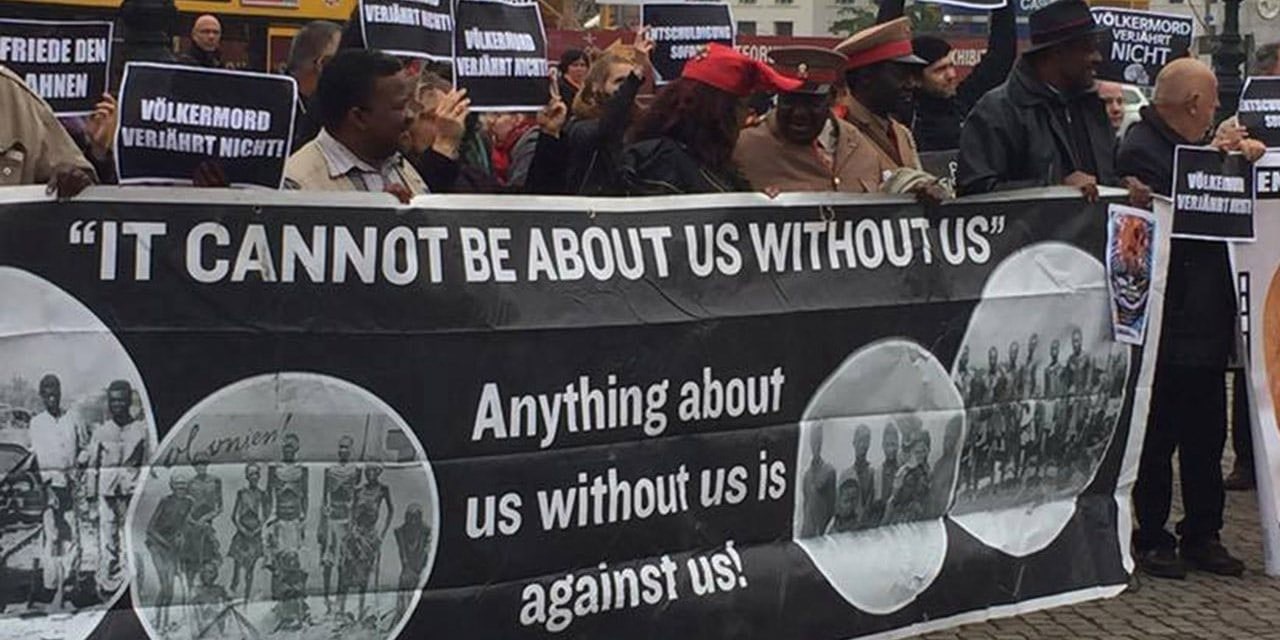Staff Writer
The President of Otjisuta Otjetu Oveni (Reparations is Ours), Jeremiah Tjatindi-Tjiveta, says it is necessary to institute a court injunction against Germany in a court in Berlin to stop her from negotiating in genocide talks with the Namibian government.
“True the Government is adamant to proceed along the lines of the Reconciliation Agreement. My view is, it’s now or never to come together (the forces opposed to the bilateral agreement) and institute an injunction order through the Administrative Court in Berlin..to stop Germany to continue with the talks,” says Tjatindi-Tjiveta, based in Australia.
The Government’s continued intransigence in pushing ahead with the Joint Declaration and Agreement pertaining to Genocide, Apology and Reparations, now termed GAR, continues to invoke vociferous reactions among a section of the affected communities that has rejected it outright since its announcement this May.
The Agreement and Joint Declaration centre around the demand of the Ovaherero, Ovambanderu and Nama for the government of the Federal Republic of Germany to recognise that the brutalities of its colonial predecessor government against Namibian indigenes during its colonial rule from 1884 to 1910, culminated in genocide against these affected communities between 1904 to 1908. The latest pronouncements to invoke the reactions of the affected communities is by Prime Minister, Saara Kuugongelwa-Amadhila, in the Windhoek Observer on Monday revealing that the matter will be debated in the National Assembly when it resumes its session on 7 September. Kuugongelwa-Amadhila said once the matter is agreed in the National Assembly, it will be submitted to Cabinet for deliberations to ensure the resolutions are in line with those passed in the National Assembly.
It is beyond the understanding of some public members, from especially the affected communities who have rejected the agreement, why it is still necessary for the Government to refer the matter that they have rejected outright to the National Assembly, suspecting the Government of hell bent on pushing ahead with the ratification of the Agreement by using its majority to steamroll it. While there’s also an opinion out there that the public opinion of the affected communities does not only matter in this emotional issue, but is crucial. Hence before the Government refers the matter back to the National Assembly, it is important to run the issue by the general public, especially of the affected communities. “It is a sign that the governing party has no regard for public opinion nor of the affected communities. It is my view they want to use Parliament to push the issue through. A vindication of Chief Afrikaner and Ombara Otjitambi Rukoro that this government has never been interested, let alone care about the loss of life [of] the Namas and Hereros and other affected communities,” a member of the affected communities feels.
“We my dear, we are with the Government therefore in Parliament we are supporting this issue so that it is concluded so that it is recorded that the fund is meagre but where is more going to come from. Otherwise it would be like putting a fish back into the water. We are done, finish,” says Urbanus Kavari, a traditional councilor in the Ovambanderu Traditional Authority.
Meantime, Chairperson of the Nama Traditional Leaders Association (NTLA), Gaob Simon Kooper, in an open appeal to the Nama Nation issued last Friday in Hoachanas, is warning his subjects against “a dubious campaign launched by Nama-speaking parliamentarians to restore trust in the ill-fated government process.” “I am speaking today to the Nama Nation so that they will note that Parliamentarians presenting themselves as mothers and daughters of the Nama people, and holding meetings with Traditional Councilors, and community leaders, in order to persuade and coach them to support the government process which has sold out the interests of the Nama and Ovaherero people,” reads Kooper’s appeal affirming this as the position of the NTLA.




